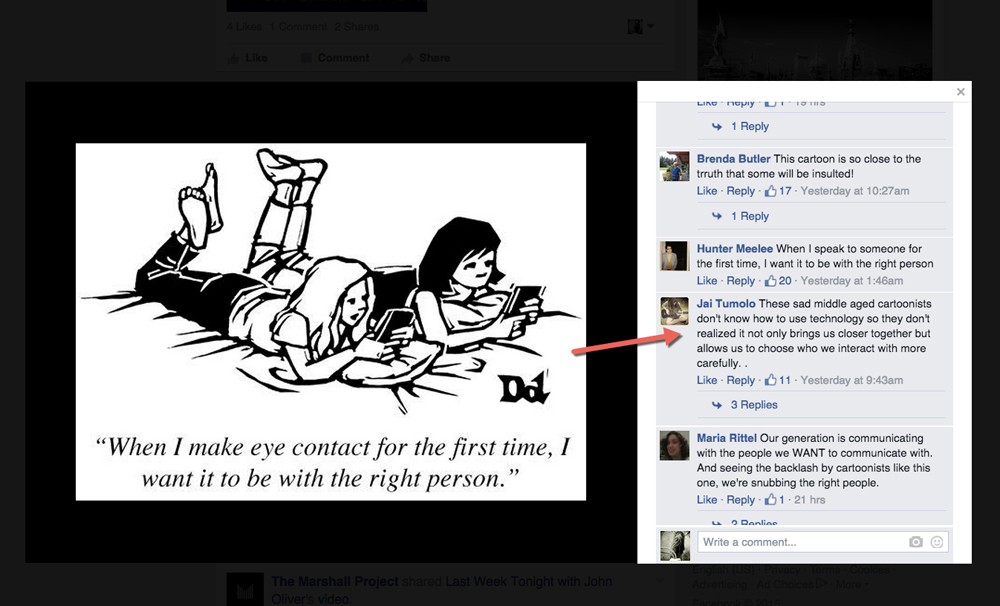‘We no longer search for news, the news finds us.’
No matter where the students were from, the amount of information coming to them via their mobile phones or the Internet – via text message, on Facebook, Twitter, chat, Skype IM, QQ, email, etc. – is overwhelming; students are inundated 24/7. As a result, most students reported that they rarely go prospecting for “hard” news at mainstream or legacy news sites. Instead they inhale, almost unconsciously, the news that is served up on the sidebar of their email account, that is on friends’ Facebook walls, that comes through on Twitter. (The World Unplugged)
Internet use is a near ‘constant’ for some teens
Teens ages 13 to 17 are also going online frequently. Aided by the convenience and constant access provided by mobile phones, 92% of teens report going online daily — with 24% using the internet “almost constantly,” 56% going online several times a day, and 12% reporting once-a-day use. Just 6% of teens report going online weekly, and 2% go online less often. (Pew: Teens, Social Media & Technology Overview 2015)
Students do most of their socializing online (Pew: Teens, Technology and Friendships)
Andrea Lunsford isn’t so sure. Lunsford is a professor of writing and rhetoric at Stanford University, where she has organized a mammoth project called the Stanford Study of Writing to scrutinize college students’ prose. From 2001 to 2006, she collected 14,672 student writing samples—everything from in-class assignments, formal essays, and journal entries to emails, blog posts, and chat sessions. Her conclusions are stirring.
“I think we’re in the midst of a literacy revolution the likes of which we haven’t seen since Greek civilization,” she says. For Lunsford, technology isn’t killing our ability to write. It’s reviving it—and pushing our literacy in bold new directions.
Clive Thompson on the New Literacy
- Students write more than previous generations
- Students are more aware of the purpose for writing and the audience
- The writing composed in social media has a performative role; writing is an enactment
No-Phone Journals: 2016 Class
Inspired in part by our class discussion of Sherry Turkle’s “Stop Googling. Let’s Talk” and in part by our own open-minded curiosity, 13 students in WRD103 volunteered to surrender their phones for four days — Tuesday, 10/13 to Friday, 10/16 — and to keep a phenomenological journal during that time.
Read some un-edited journal entries, below. The next step is to think together about how to turn these experiences, questions, and observations into Op-Ed essays, or other reflective projects: 
Katy: “I actually had to use an alarm clock and watch”
Alex: “first instinct: tweet about it, and I did via twitter.com instead of the app (since I hadn’t had my phone taken for more than 5 minutes before I did this)”
Sam: “Insight: I actually have a skewed version of time and less patience. I have to wait for someone to email me back. I HAVE TO WAIT. WITH NOTHING TO DO… no Snapchat, Instagram, nothing.”
Charlie: “Notable differences I’ve noticed are that I miss my music. I can’t say I miss anything else.”
Cristina: “I asked my roommate several times to borrow her phone and I am pretty sure she got very annoyed.”
Gabi: “I keep feeling like I was missing something …”
Paulina: “I was talking to them, but they were doing something on their phones. “
Anela: “Right before I had to give my phone in I got really shaky and nervous.”
Dzejna: “As I was writing my name on the pink post-it and wrapping the rubber band around my phone, I felt a sense of anxiety and excitement in my stomach.”
Tania: “The first day sucked the most out of all 3 days.”

